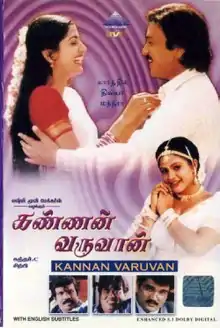Kannan Varuvaan
Kannan Varuvaan (English: Kannan will come) is a 2000 Indian Tamil film written and directed by Sundar C. The film stars Karthik, Manthra and Divya Unni in the lead roles, while Goundamani, Senthil, Manorama, Ranjith and Radha Ravi play supporting roles. The music was composed by Sirpy with editing done by P. Sai Suresh and cinematography by U. K. Senthil Kumar. The film released on 25 May 2000. The film and its soundtrack were a huge hit upon release.[1]
| Kannan Varuvaan | |
|---|---|
 | |
| Directed by | Sundar C |
| Produced by | K. Muralidharan V. Swaminathan G. Venugopal |
| Screenplay by | Sundar C |
| Story by | D. Singampuli |
| Starring | Karthik Manthra Divya Unni Goundamani Senthil Ranjith Manorama Radha Ravi |
| Music by | Sirpy |
| Cinematography | U. K. Senthil Kumar |
| Edited by | P. Sai Suresh |
Production company | Lakshmi Movie Makers |
Release date | 25 May 2000 |
Running time | 136 minutes |
| Country | India |
| Language | Tamil |
Plot
Kannan's (Karthik) ambition in life is to take up the construction of the temple left incomplete by his forefathers. Unfortunately, funds are not forthcoming. Thannirmalai (Goundamani) assures Kannan that with his employer's help, Kannan's dream could become a reality. Unfortunately for Thannirmalai, he becomes disappointed when his employer, the wealthy landlady Ranganayagi's (Manorama) grandson Raghu (Ranjith), turns out to be money-minded and heartless. In a fit of anger, Thannirmalai pushes Raghu into a river and thinks that he has committed a murder. Kannan is made to enter the scene as an impostor by pretending to be Raghu. Meanwhile, there is a love triangle between Kannan, Rajeswari (Manthra) and Parvathi (Divya Unni). What follows forms the crux of the story.
Cast
- Karthik as Kannan/Raghu
- Manthra as Rajeshwari
- Divya Unni as Parvathi (Voice dubbed by Jayageetha)
- Goundamani as Thannirmalai/Adiyapatham/Ezhumalai
- Manorama as Ranganayagi (Aatha)
- Ranjith as Raghu
- Radha Ravi
- Senthil as Sooravali
- Soori as Man in a temple
- Ishari K. Ganesh as Government Servant
- Kazan Khan
- Mayilsamy
- Theni Kunjarammal
- Periya Karuppu Thevar
- Balu Anand
- Vichu Vishwanath
- Halwa Vasu
- Nellai Siva
- K. S. Jayalakshmi
- Chelladurai as Parvathi's uncle
- Sujith Sagar as Collector
- Vijay Ganesh as Servant
- Anuja
- Deepika
- Ravichandran
- Amulraj Vaathiyar
Soundtrack
The soundtrack was composed by Sirpy.[2][3]
| No. | Song | Singers | Lyrics |
|---|---|---|---|
| 1 | "Kadala Kaattu Kuyile" | Shankar Mahadevan, Sujatha | P. Vijay |
| 2 | "Kaatrukku Pookal" | Hariharan, Sujatha | |
| 3 | "Kattraruntha Thendrale" | Shankar Mahadevan | Pazhani Bharathi |
| 4 | "Kooda Mela" | S. P. B. Charan, Yugendran, K. S. Chithra | P. Vijay |
| 5 | "Seeraga Samba" | S. Janaki, S. P. Balasubrahmanyam | Pazhani Bharathi |
| 6 | "Vennilavae Vennilavae" | Hariharan | |
References
- "Film Review: Kannan Varuvaan". The Hindu. 2 June 2000. Retrieved 25 August 2012.
- http://play.raaga.com/tamil/album/Kannan-Varuvan-songs-T0000254
- http://starmusiq.com/tamil_movie_songs_free_download.asp?MovieId=730